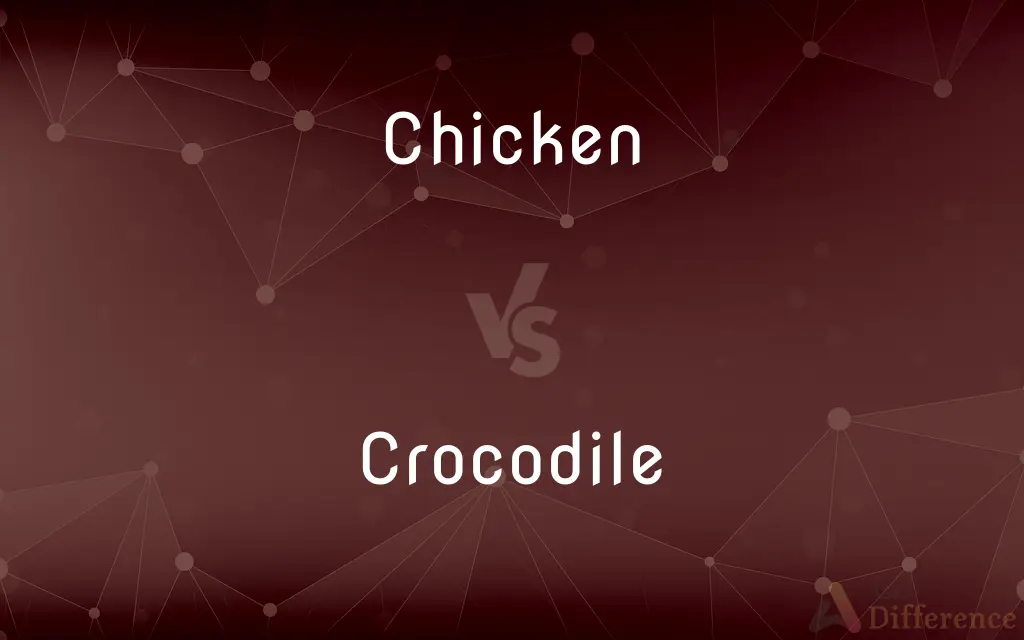Chicken vs. Crocodile — What's the Difference?
Edited by Tayyaba Rehman — By Fiza Rafique — Updated on April 15, 2024
Chicken is a domesticated bird raised for meat and eggs, while crocodile is a large aquatic reptile known for its tough skin and predatory nature.

Difference Between Chicken and Crocodile
Table of Contents
ADVERTISEMENT
Key Differences
Chickens are primarily farmed for their meat and eggs, contributing significantly to human diets worldwide. On the other hand, crocodiles are wild animals, not typically farmed but sometimes hunted for their meat and skin.
Chickens are smaller, typically weighing up to a few kilograms, and are easier to manage in farm settings. Whereas crocodiles can grow very large, some species reaching over 5 meters in length, posing significant challenges if kept in captivity.
In terms of habitat, chickens are adaptable and can thrive in various controlled environments like farms or backyards. Conversely, crocodiles are mostly found in freshwater environments such as rivers, lakes, and wetlands, requiring specific ecological conditions.
Chickens reproduce by laying eggs, which are incubated for about 21 days before hatching. In contrast, crocodiles also lay eggs, but their incubation can vary widely, generally between 65 and 95 days, depending on the species and environmental conditions.
Comparison Chart
Usage
Raised for meat and eggs
Hunted for meat and skin
ADVERTISEMENT
Size
Small, a few kilograms
Large, up to 5 meters or more
Habitat
Farms, backyards
Freshwater rivers, lakes, wetlands
Reproduction
Eggs incubated for ~21 days
Eggs incubated for 65-95 days
Social Behavior
Social, lives in flocks
Solitary, highly aggressive
Compare with Definitions
Chicken
A domesticated fowl raised for its meat and eggs.
The farm raises chickens primarily for their fresh eggs.
Crocodile
An animal that requires significant conservation efforts.
The national park has been successful in its crocodile conservation efforts.
Chicken
The meat from this bird, often used in cooking.
Chicken is a popular choice for many healthy dishes.
Crocodile
Known for their tough skin, which is valued in luxury fashion.
Genuine crocodile leather is often used for high-end bags.
Chicken
In games, an individual who shows reluctance to participate in risky challenges.
Don't be such a chicken—try the roller coaster!
Crocodile
A creature often found in myths and legends, symbolizing danger and power.
The crocodile is a common antagonist in folklore.
Chicken
A simple, farmyard animal kept by people across the globe.
Their backyard is home to a couple of chickens.
Crocodile
Used metaphorically to describe someone who is deceptively emotional.
His tears were just crocodile tears; he wasn’t really sad.
Chicken
A term used colloquially to describe someone as fearful or timid.
He was too chicken to jump into the lake.
Crocodile
A large predatory reptile with a long, V-shaped snout.
The crocodile lay still, barely visible above the water.
Chicken
A domestic fowl kept for its eggs or meat, especially a young one
Rationing was still in force and most people kept chickens
Crocodile
Crocodiles (family Crocodylidae) or true crocodiles are large semiaquatic reptiles that live throughout the tropics in Africa, Asia, the Americas and Australia. The term crocodile is sometimes used even more loosely to include all extant members of the order Crocodilia, which includes the alligators and caimans (family Alligatoridae), the gharial and false gharial (family Gavialidae), and all other living and fossil Crocodylomorpha.
Chicken
Cowardly
I was too chicken to go to court
Crocodile
Any of various large aquatic reptiles of the family Crocodylidae that are native to tropical and subtropical regions and have thick, armorlike skin and long tapering jaws.
Chicken
Withdraw from or fail in something through lack of nerve
The referee chickened out of giving a penalty
Crocodile
A crocodilian reptile, such as an alligator, caiman, or gharial.
Chicken
A common domesticated fowl (Gallus domesticus) widely raised for meat and eggs and believed to be descended from the jungle fowl G. gallus.
Crocodile
Leather made from crocodile skin.
Chicken
Any of various similar or related birds.
Crocodile
Any of the predatory amphibious reptiles of the family Crocodylidae; (loosely) a crocodilian, any species of the order Crocodilia, which also includes the alligators, caimans and gavials.
Chicken
The flesh of the chicken, used as food.
Crocodile
A long line or procession of people (especially children) walking together.
Chicken
(Slang) A coward.
Crocodile
(logic) A fallacious dilemma, mythically supposed to have been first used by a crocodile.
Chicken
Any of various foolhardy competitions in which the participants persist in a dangerous course of action until one loses nerve and stops.
Crocodile
(intransitive) To speak one's native language at an Esperanto-language gathering, rather than Esperanto.
Chicken
Vulgar Slang A young gay male, especially as sought by an older man.
Crocodile
A large reptile of the genus Crocodilus, of several species. They grow to the length of sixteen or eighteen feet, and inhabit the large rivers of Africa, Asia, and America. The eggs, laid in the sand, are hatched by the sun's heat. The best known species is that of the Nile (Crocodilus vulgaris, or Crocodilus Niloticus). The Florida crocodile (Crocodilus Americanus) is much less common than the alligator and has longer jaws. The name is also sometimes applied to the species of other related genera, as the gavial and the alligator.
Chicken
Afraid; cowardly.
Crocodile
A fallacious dilemma, mythically supposed to have been first used by a crocodile.
Chicken
To act in a cowardly manner; lose one's nerve
Chickened out at the last moment.
Crocodile
Large voracious aquatic reptile having a long snout with massive jaws and sharp teeth and a body covered with bony plates; of sluggish tropical waters
Chicken
(countable) A domesticated species of junglefowl (usually, Gallus gallus; sometimes, Gallus gallus domesticus or Gallus domesticus), especially so-called when young.
Chicken
(uncountable) The meat from this bird eaten as food.
Chicken
(archaic) The young of any bird; a chick.
Chicken
A coward.
Chicken
A young or inexperienced person.
Chicken
A young, attractive, slim man, usually having little body hair; compare chickenhawk.
Chicken
The game of dare.
Chicken
A confrontational game in which the participants move toward each other at high speed (usually in automobiles); the player who turns first to avoid colliding into the other is the chicken (that is, the loser).
Don't play chicken with a freight train; you're guaranteed to lose.
Chicken
A simple dance in which the movements of a chicken are imitated.
Chicken
A kilogram of cocaine.
Chicken
Plural of chick
Chicken
(informal) Cowardly.
Why do you refuse to fight? Huh, I guess you're just too chicken.
Chicken
(intransitive) To avoid a situation one is afraid of.
Chicken
A young bird or fowl, esp. a young barnyard fowl.
Chicken
A young person; a child; esp. a young woman; a maiden; same as spring chicken.
Chicken
The flesh of a chicken used for food
Chicken
A domestic fowl bred for flesh or eggs; believed to have been developed from the red jungle fowl
Chicken
A person who lacks confidence, is irresolute and wishy-washy
Chicken
A foolhardy competition; a dangerous activity that is continued until one competitor becomes afraid and stops
Chicken
Easily frightened
Common Curiosities
Are chickens considered intelligent animals?
Chickens are considered to have a moderate level of intelligence among birds.
How dangerous are crocodiles to humans?
Crocodiles can be very dangerous due to their size and predatory nature.
What is the lifespan of a crocodile?
Crocodiles can live for several decades, often over 70 years in the wild.
What do crocodiles eat?
Crocodiles are carnivores, primarily eating fish, birds, mammals, and occasionally other reptiles.
Can chickens live in the wild?
While chickens can survive in the wild, they are predominantly domesticated animals.
How fast can a crocodile run?
Crocodiles can run up to 11 miles per hour over short distances on land.
What are the primary uses of chickens?
Chickens are primarily raised for their meat and eggs.
Are crocodiles endangered?
Some species of crocodile are endangered due to habitat loss, poaching, and pollution.
What type of environments do chickens prefer?
Chickens prefer safe, enclosed spaces like coops or fenced areas to protect against predators.
How do chickens communicate?
Chickens communicate through a variety of vocalizations to signal danger, food, or social status.
Share Your Discovery

Previous Comparison
Shook vs. Shaken
Next Comparison
Loyer vs. LawyerAuthor Spotlight
Written by
Fiza RafiqueFiza Rafique is a skilled content writer at AskDifference.com, where she meticulously refines and enhances written pieces. Drawing from her vast editorial expertise, Fiza ensures clarity, accuracy, and precision in every article. Passionate about language, she continually seeks to elevate the quality of content for readers worldwide.
Edited by
Tayyaba RehmanTayyaba Rehman is a distinguished writer, currently serving as a primary contributor to askdifference.com. As a researcher in semantics and etymology, Tayyaba's passion for the complexity of languages and their distinctions has found a perfect home on the platform. Tayyaba delves into the intricacies of language, distinguishing between commonly confused words and phrases, thereby providing clarity for readers worldwide.














































